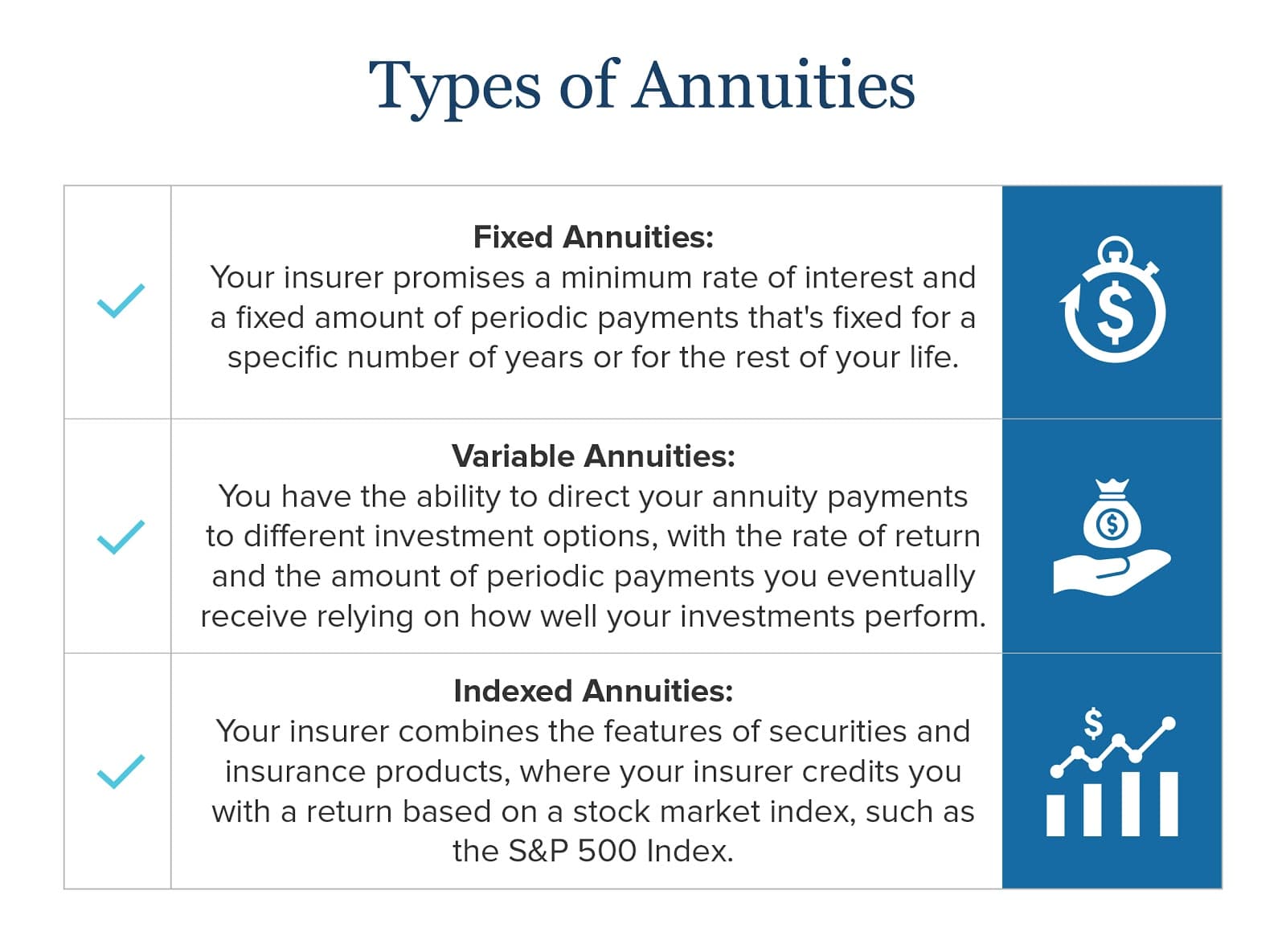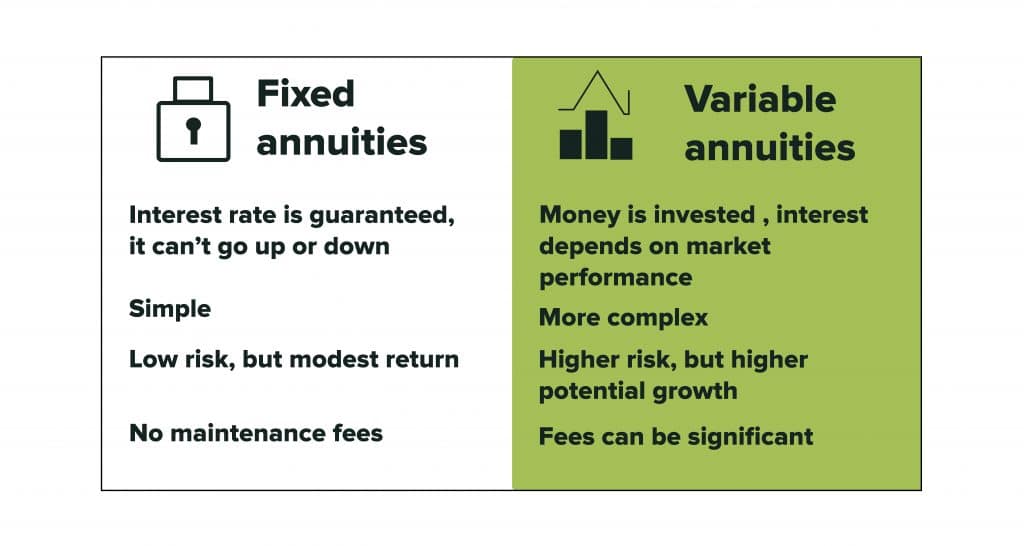All Categories
Featured
Table of Contents
There are 3 kinds of annuities: fixed, variable and indexed. With a taken care of annuity, the insurance provider ensures both the price of return (the rates of interest) and the payment to the financier. The interest price on a taken care of annuity can change with time. Typically the rate of interest is repaired for a number of years and after that changes periodically based on present prices.
With a deferred set annuity, the insurance provider agrees to pay you no less than a defined price of interest as your account is expanding. With a prompt fixed annuityor when you "annuitize" your postponed annuityyou get an established set amount of money, typically on a monthly basis (similar to a pension).
And, unlike a dealt with annuity, variable annuities don't give any kind of assurance that you'll gain a return on your financial investment. Rather, there's a threat that you can in fact lose cash.
Analyzing Pros And Cons Of Fixed Annuity And Variable Annuity Key Insights on Fixed Vs Variable Annuity What Is the Best Retirement Option? Benefits of Annuities Variable Vs Fixed Why Fixed Vs Variable Annuity Pros And Cons Is a Smart Choice Fixed Annuity Vs Equity-linked Variable Annuity: Simplified Key Differences Between Different Financial Strategies Understanding the Risks of Annuity Fixed Vs Variable Who Should Consider Annuities Variable Vs Fixed? Tips for Choosing the Best Investment Strategy FAQs About Fixed Annuity Or Variable Annuity Common Mistakes to Avoid When Planning Your Retirement Financial Planning Simplified: Understanding Your Options A Beginner’s Guide to Retirement Income Fixed Vs Variable Annuity A Closer Look at Variable Annuity Vs Fixed Indexed Annuity
Due to the complexity of variable annuities, they're a leading source of financier problems to FINRA. Prior to purchasing a variable annuity, very carefully reviewed the annuity's program, and ask the individual offering the annuity to describe all of the item's functions, motorcyclists, expenses and restrictions. You must also understand exactly how your broker is being made up, including whether they're receiving a payment and, if so, just how much.
Indexed annuities are complicated monetary instruments that have features of both dealt with and variable annuities. Indexed annuities normally offer a minimal guaranteed rate of interest combined with a rate of interest rate linked to a market index. Several indexed annuities are connected to wide, widely known indexes like the S&P 500 Index. Yet some usage various other indexes, including those that stand for other segments of the market.
Recognizing the functions of an indexed annuity can be confusing. There are several indexing techniques companies use to compute gains and, because of the selection and intricacy of the methods used to credit report interest, it's hard to contrast one indexed annuity to one more. Indexed annuities are typically categorized as one of the complying with two types: EIAs offer a guaranteed minimum rate of interest (normally at the very least 87.5 percent of the premium paid at 1 to 3 percent interest), in addition to an additional rate of interest tied to the performance of several market index.

Traditional financiers who value safety and security and stability. Those nearing retirement that intend to shelter their properties from the volatility of the supply or bond market. With variable annuities, you can purchase a selection of safety and securities including stock and bond funds. Securities market efficiency identifies the annuity's value and the return you will obtain from the cash you spend.
Comfy with changes in the securities market and want your financial investments to equal inflation over an extended period of time. Young and wish to prepare economically for retirement by gaining the gains in the supply or bond market over the lengthy term.
As you're developing your retirement cost savings, there are numerous means to extend your money. can be particularly valuable cost savings devices because they assure a revenue quantity for either a set period of time or for the remainder of your life. Repaired and variable annuities are two choices that provide tax-deferred growth on your contributionsthough they do it in different methods.
Decoding What Is Variable Annuity Vs Fixed Annuity Key Insights on Your Financial Future What Is the Best Retirement Option? Pros and Cons of Variable Annuities Vs Fixed Annuities Why Choosing the Right Financial Strategy Is a Smart Choice How to Compare Different Investment Plans: Simplified Key Differences Between Different Financial Strategies Understanding the Key Features of Variable Vs Fixed Annuity Who Should Consider Variable Annuity Vs Fixed Indexed Annuity? Tips for Choosing the Best Investment Strategy FAQs About Tax Benefits Of Fixed Vs Variable Annuities Common Mistakes to Avoid When Choosing Pros And Cons Of Fixed Annuity And Variable Annuity Financial Planning Simplified: Understanding Your Options A Beginner’s Guide to Smart Investment Decisions A Closer Look at How to Build a Retirement Plan
variable annuity or both as you outline out your retirement earnings plan. An offers a guaranteed rate of interest. It's taken into consideration a traditional item, supplying a moderate profits that are not tied to market performance. Your agreement worth will certainly raise due to the accrual of guaranteed rate of interest profits, meaning it won't decline if the marketplace experiences losses.
Your variable annuity's financial investment efficiency will affect the size of your nest egg. When you begin taking annuity settlements, they will depend on the annuity value at that time.
Market losses likely will result in smaller sized payouts. Any type of interest or various other gains in either sort of agreement are protected from current-year taxation; your tax obligation responsibility will certainly come when withdrawals start. Let's check out the core features of these annuities so you can decide just how one or both may fit with your overall retired life technique.

A fixed annuity's value will certainly not decline because of market lossesit's constant and stable. On the various other hand, variable annuity worths will certainly change with the efficiency of the subaccounts you elect as the marketplaces rise and drop. Revenues on your taken care of annuity will extremely rely on its contracted price when bought.
On the other hand, payout on a repaired annuity acquired when rate of interest are low are most likely to pay earnings at a reduced price. If the rate of interest is assured for the length of the agreement, incomes will stay continuous no matter the markets or price activity. A fixed price does not imply that taken care of annuities are risk-free.
While you can't land on a set rate with a variable annuity, you can select to buy conservative or hostile funds tailored to your risk level. Extra conventional financial investment alternatives, such as short-term bond funds, can assist reduce volatility in your account. Considering that taken care of annuities provide a set rate, dependent upon current rates of interest, they do not supply that same versatility.
Decoding How Investment Plans Work Everything You Need to Know About Deferred Annuity Vs Variable Annuity Defining Variable Annuity Vs Fixed Annuity Benefits of Fixed Annuity Vs Equity-linked Variable Annuity Why Choosing the Right Financial Strategy Matters for Retirement Planning How to Compare Different Investment Plans: Explained in Detail Key Differences Between Different Financial Strategies Understanding the Rewards of Deferred Annuity Vs Variable Annuity Who Should Consider Variable Annuities Vs Fixed Annuities? Tips for Choosing Fixed Index Annuity Vs Variable Annuity FAQs About Planning Your Financial Future Common Mistakes to Avoid When Planning Your Retirement Financial Planning Simplified: Understanding Your Options A Beginner’s Guide to Smart Investment Decisions A Closer Look at Fixed Annuity Vs Variable Annuity

Of the its assured growth from accumulated rate of interest settlements sticks out. Repaired rates of interest supply modest growth for their assured incomes. You possibly might make more lengthy term by taking extra threat with a variable annuity, but you can also shed cash. While dealt with annuity contracts prevent market danger, their compromise is much less growth possibility.
Investing your variable annuity in equity funds will certainly provide even more possible for gains. The charges linked with variable annuities may be greater than for various other annuities.
The insurance coverage firm may enforce surrender charges, and the Internal revenue service may impose an early withdrawal tax obligation charge. They begin at a certain percentage and then decline over time.
Annuity incomes go through a 10% early withdrawal tax charge if taken before you get to age 59 unless an exception applies. This is imposed by the IRS and relates to all annuities. Both taken care of and variable annuities give alternatives for annuitizing your equilibrium and turning it into an assured stream of life time revenue.
Highlighting Variable Annuities Vs Fixed Annuities Everything You Need to Know About Tax Benefits Of Fixed Vs Variable Annuities Breaking Down the Basics of Investment Plans Benefits of Choosing Between Fixed Annuity And Variable Annuity Why Choosing the Right Financial Strategy Matters for Retirement Planning Fixed Income Annuity Vs Variable Growth Annuity: How It Works Key Differences Between Different Financial Strategies Understanding the Rewards of Variable Vs Fixed Annuity Who Should Consider Strategic Financial Planning? Tips for Choosing the Best Investment Strategy FAQs About Tax Benefits Of Fixed Vs Variable Annuities Common Mistakes to Avoid When Planning Your Retirement Financial Planning Simplified: Understanding Your Options A Beginner’s Guide to Smart Investment Decisions A Closer Look at Fixed Vs Variable Annuities
You might decide to make use of both fixed and variable annuities. However if you're selecting one over the various other, the differences issue: A may be a better choice than a variable annuity if you have an extra conventional risk resistance and you seek predictable rate of interest and principal defense. A may be a much better alternative if you have a greater threat tolerance and desire the potential for lasting market-based development.
Annuities are agreements offered by insurance provider that guarantee the customer a future payment in routine installments, typically regular monthly and frequently forever. There are different sorts of annuities that are made to offer different functions. Returns can be fixed or variable, and payouts can be prompt or delayed. A fixed annuity guarantees repayment of a set quantity for the term of the arrangement.
A variable annuity changes based on the returns on the common funds it is spent in. An immediate annuity begins paying out as quickly as the purchaser makes a lump-sum payment to the insurance company.
Annuities' returns can be either fixed or variable. With a fixed annuity, the insurance coverage company assures the purchaser a particular payment at some future day.
Table of Contents
Latest Posts
Highlighting the Key Features of Long-Term Investments A Closer Look at How Retirement Planning Works Defining Annuities Variable Vs Fixed Advantages and Disadvantages of Variable Annuity Vs Fixed Ann
Breaking Down Your Investment Choices A Comprehensive Guide to Fixed Vs Variable Annuities What Is the Best Retirement Option? Advantages and Disadvantages of Different Retirement Plans Why Choosing t
Breaking Down Fixed Annuity Or Variable Annuity A Comprehensive Guide to Fixed Index Annuity Vs Variable Annuity Breaking Down the Basics of Investment Plans Benefits of Fixed Annuity Vs Variable Annu
More
Latest Posts